中考英语情态动词专题复习
- 格式:docx
- 大小:74.48 KB
- 文档页数:16

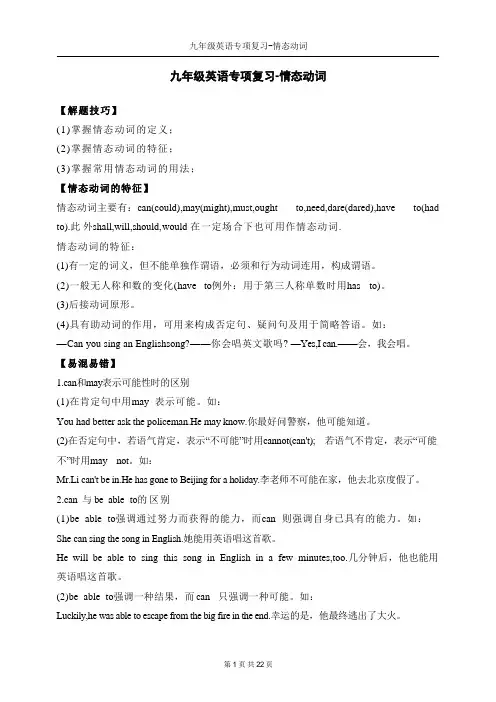
九年级英语专项复习-情态动词【解题技巧】(1)掌握情态动词的定义;(2)掌握情态动词的特征;(3)掌握常用情态动词的用法;【情态动词的特征】情态动词主要有:can(could),may(might),must,ought to,need,dare(dared),have to(had to).此外shall,will,should,would 在一定场合下也可用作情态动词.情态动词的特征:(1)有一定的词义,但不能单独作谓语,必须和行为动词连用,构成谓语。
(2)一般无人称和数的变化(have to例外:用于第三人称单数时用has to)。
(3)后接动词原形。
(4)具有助动词的作用,可用来构成否定句、疑问句及用于简略答语。
如:—Can you sing an Englishsong?——你会唱英文歌吗? —Yes,I can.——会,我会唱。
【易混易错】1.can和may表示可能性时的区别(1)在肯定句中用may 表示可能。
如:You had better ask the policeman.He may know.你最好问警察,他可能知道。
(2)在否定句中,若语气肯定,表示“不可能”时用cannot(can't); 若语气不肯定,表示“可能不”时用may not。
如:Mr.Li can't be in.He has gone to Beijing for a holiday.李老师不可能在家,他去北京度假了。
2.can 与 be able to的区别(1)be able to强调通过努力而获得的能力,而can 则强调自身已具有的能力。
如:She can sing the song in English.她能用英语唱这首歌。
He will be able to sing this song in English in a few minutes,too.几分钟后,他也能用英语唱这首歌。
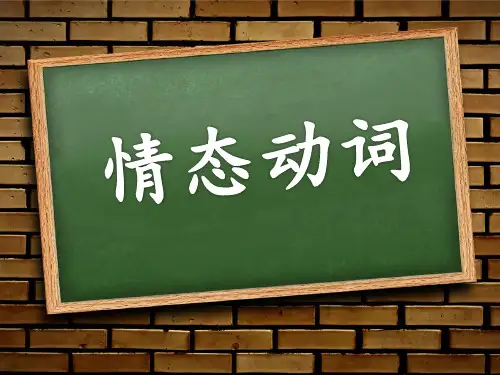
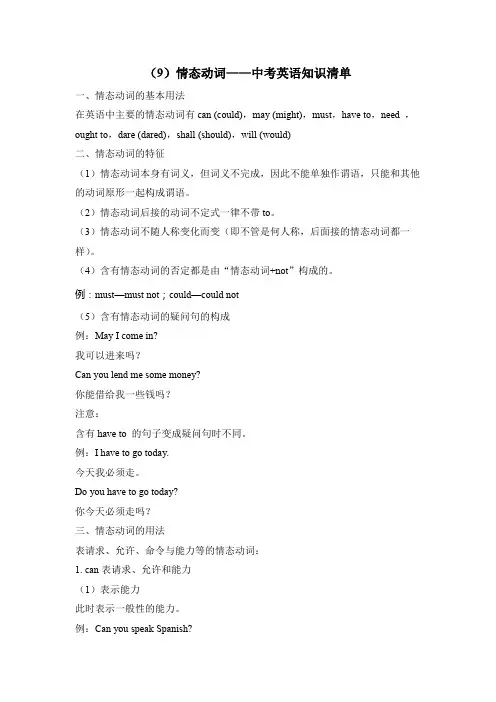
(9)情态动词——中考英语知识清单一、情态动词的基本用法在英语中主要的情态动词有can (could),may (might),must,have to,need ,ought to,dare (dared),shall (should),will (would)二、情态动词的特征(1)情态动词本身有词义,但词义不完成,因此不能单独作谓语,只能和其他的动词原形一起构成谓语。
(2)情态动词后接的动词不定式一律不带to。
(3)情态动词不随人称变化而变(即不管是何人称,后面接的情态动词都一样)。
(4)含有情态动词的否定都是由“情态动词+not”构成的。
例:must—must not;could—could not(5)含有情态动词的疑问句的构成例:May I come in?我可以进来吗?Can you lend me some money?你能借给我一些钱吗?注意:含有have to 的句子变成疑问句时不同。
例:I have to go today.今天我必须走。
Do you have to go today?你今天必须走吗?三、情态动词的用法表请求、允许、命令与能力等的情态动词:1. can表请求、允许和能力(1)表示能力此时表示一般性的能力。
例:Can you speak Spanish?你会讲西班牙语吗?Who can answer this question?谁能回答这个问题?(2)表示“请求允许”,多用于口语中例:Can I help you?我可以帮你吗?Mom, can I wear my new dress today?妈妈,今天我可以穿我的新连衣裙吗?(3)表示“允许”表示“允许(做某事)”,与may的意思差不多,在日常口语中常用can。
例:You can park your car here.你可以把车停在这里。
You can phone me after six this afternoon.今天下午六点后你可以给我打电话。

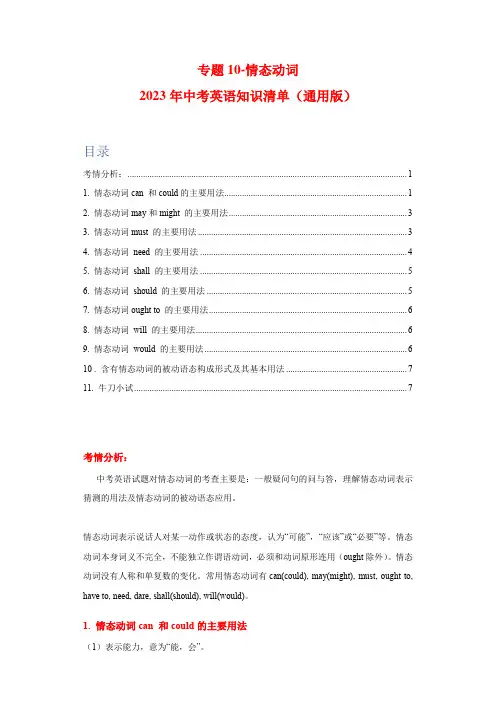
专题10-情态动词2023年中考英语知识清单(通用版)目录考情分析: (1)1. 情态动词can 和could的主要用法 (1)2. 情态动词may和might 的主要用法 (3)3. 情态动词must 的主要用法 (3)4. 情态动词need 的主要用法 (4)5. 情态动词shall 的主要用法 (5)6. 情态动词should 的主要用法 (5)7. 情态动词ought to 的主要用法 (6)8. 情态动词will 的主要用法 (6)9. 情态动词would 的主要用法 (6)10 . 含有情态动词的被动语态构成形式及其基本用法 (7)11. 牛刀小试 (7)考情分析:中考英语试题对情态动词的考查主要是:一般疑问句的问与答,理解情态动词表示猜测的用法及情态动词的被动语态应用。
情态动词表示说话人对某一动作或状态的态度,认为“可能”,“应该”或“必要”等。
情态动词本身词义不完全,不能独立作谓语动词,必须和动词原形连用(ought除外)。
情态动词没有人称和单复数的变化。
常用情态动词有can(could), may(might), must, ought to, have to, need, dare, shall(should), will(would)。
1. 情态动词can 和could的主要用法(1)表示能力,意为“能,会”。
如:Can you swim?你能游泳吗?His granny is over eighty but still can read without glasses.他的奶奶虽然八十多岁了,但是仍旧不用戴眼镜能够阅读。
can和be able to表示“能力”时的区别:can只有现在式和过去式两种形式,而be able to 除了现在式和过去式,还有将来式和完成式等多种形式。
如:She will be able to help you tomorrow afternoon.明天下午她将能帮助你。
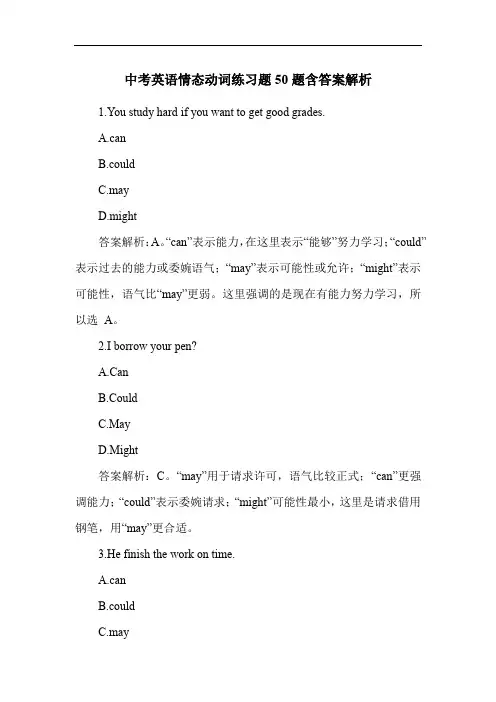
中考英语情态动词练习题50题含答案解析1.You study hard if you want to get good grades.A.canB.couldC.mayD.might答案解析:A。
“can”表示能力,在这里表示“能够”努力学习;“could”表示过去的能力或委婉语气;“may”表示可能性或允许;“might”表示可能性,语气比“may”更弱。
这里强调的是现在有能力努力学习,所以选A。
2.I borrow your pen?A.CanB.CouldC.MayD.Might答案解析:C。
“may”用于请求许可,语气比较正式;“can”更强调能力;“could”表示委婉请求;“might”可能性最小,这里是请求借用钢笔,用“may”更合适。
3.He finish the work on time.A.canB.couldC.may答案解析:A。
“can”表示能力,这里表示他有能力按时完成工作;“could”过去的能力或委婉语气;“may”表示可能性或允许;“might”可能性最小,这里强调能力,选A。
4. you help me with this problem?A.CanB.CouldC.MayD.Might答案解析:B。
“could”在这里表示委婉地请求帮助;“can”语气比较直接;“may”和“might”主要表示可能性和允许,不太符合语境。
5.She come to the party if she has time.A.canB.couldC.mayD.might答案解析:C。
“may”表示可能性,在这里表示她有可能来参加派对如果有时间;“can”表示能力;“could”过去的能力或委婉语气;“might”可能性比“may”更小。
6.We go to the park if it doesn't rain.A.canB.couldD.might答案解析:A。
“can”表示能够,这里表示如果不下雨我们能够去公园;“could”过去的能力或委婉语气;“may”表示可能性或允许;“might”可能性最小。
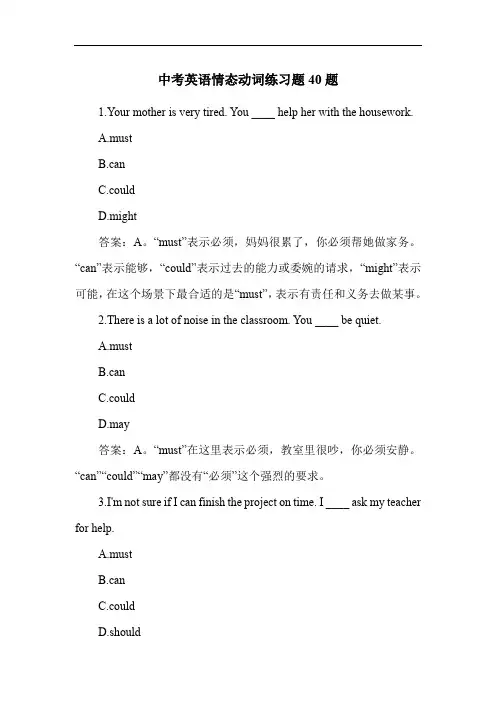
中考英语情态动词练习题40题1.Your mother is very tired. You ____ help her with the housework.A.mustB.canC.couldD.might答案:A。
“must”表示必须,妈妈很累了,你必须帮她做家务。
“can”表示能够,“could”表示过去的能力或委婉的请求,“might”表示可能,在这个场景下最合适的是“must”,表示有责任和义务去做某事。
2.There is a lot of noise in the classroom. You ____ be quiet.A.mustB.canC.couldD.may答案:A。
“must”在这里表示必须,教室里很吵,你必须安静。
“can”“could”“may”都没有“必须”这个强烈的要求。
3.I'm not sure if I can finish the project on time. I ____ ask my teacher for help.A.mustB.canC.couldD.should答案:C。
“could”表示委婉的请求或可能性,不确定能否按时完成项目,可以委婉地请求老师帮助。
“must”语气太强硬,“can”表示能力,“should”表示应该,在这个场景下“could”最合适。
4.You ____ play football in the street. It's very dangerous.A.mustn'tB.can'tC.couldn'tD.mightn't答案:A。
“mustn't”表示禁止,在街上踢足球很危险,所以是禁止的。
“can't”“couldn't”“mightn't”都没有“禁止”这个强烈的意思。
5.I have a lot of homework to do. I ____ watch TV tonight.A.mustn'tB.can'tC.couldn'tD.may not答案:B。
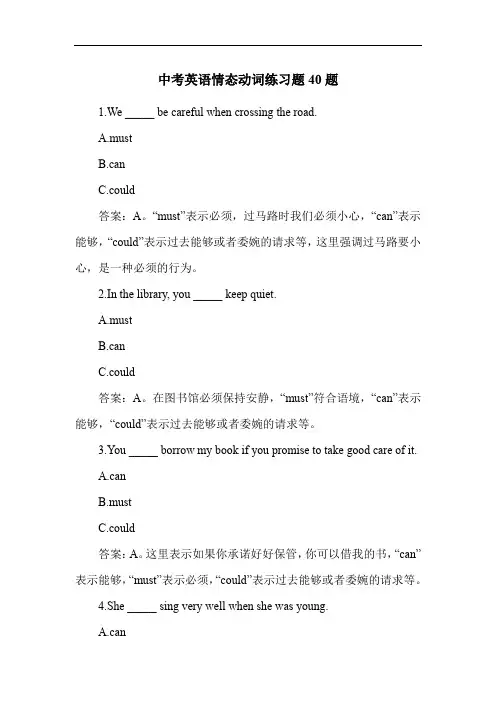
中考英语情态动词练习题40题1.We _____ be careful when crossing the road.A.mustB.canC.could答案:A。
“must”表示必须,过马路时我们必须小心,“can”表示能够,“could”表示过去能够或者委婉的请求等,这里强调过马路要小心,是一种必须的行为。
2.In the library, you _____ keep quiet.A.mustB.canC.could答案:A。
在图书馆必须保持安静,“must”符合语境,“can”表示能够,“could”表示过去能够或者委婉的请求等。
3.You _____ borrow my book if you promise to take good care of it.A.canB.mustC.could答案:A。
这里表示如果你承诺好好保管,你可以借我的书,“can”表示能够,“must”表示必须,“could”表示过去能够或者委婉的请求等。
4.She _____ sing very well when she was young.A.canB.couldC.must答案:B。
表示她年轻时能够唱歌很好,“could”表示过去能够,“can”表示现在能够,“must”表示必须。
5.We _____ finish our homework on time.A.mustB.canC.could答案:A。
我们必须按时完成作业,“must”符合语境,“can”表示能够,“could”表示过去能够或者委婉的请求等。
6.You _____ come to my party if you are free.A.canB.mustC.could答案:A。
如果你有空,你可以来我的派对,“can”表示能够,“must”表示必须,“could”表示过去能够或者委婉的请求等。
7.He _____ swim when he was five years old.A.canB.couldC.must答案:B。
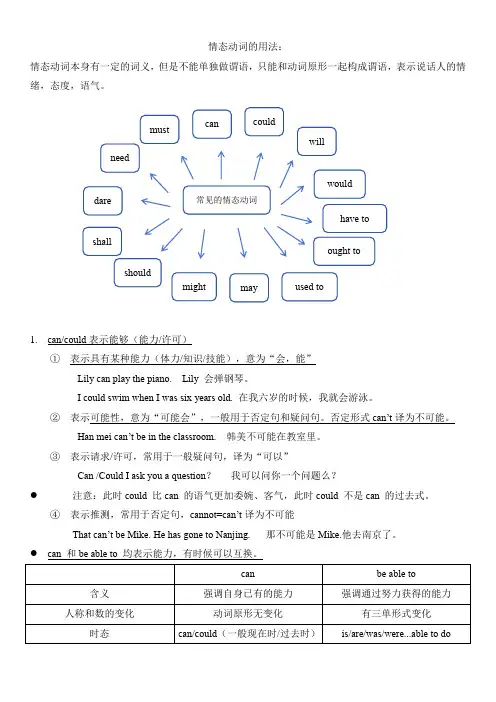
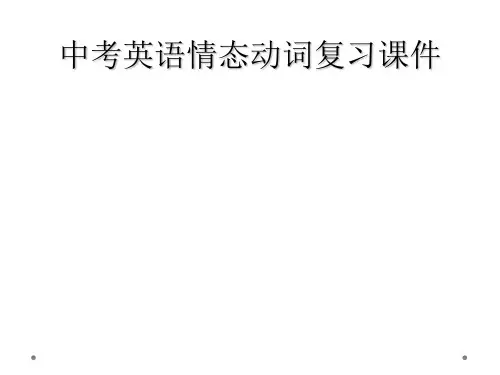
中考考点_情态动词知识点汇总情态动词是表示说话人的意愿、命令、建议、推测、推断、可能性等的动词,汇总如下:1. Can:表示许可或能力- Can I use your pen?- She can speak three languages.2. Could:表示过去的许可或能力,或表示委婉的请求或建议- Could you lend me your book?- He could swim when he was five.3. May:表示许可或可能性- May I go to the party?- It may rain later.4. Might:表示很小的可能性- He might be at home.5. Must:表示有必要或肯定- You must finish your homework before going out.- It must be cold outside.6. Should:表示建议或应该- You should study harder.7. Shall:表示征求意见或提出建议,或用于第一人称的疑问句中- Shall we go to the movies tonight?- What shall I do with this problem?8. Will:表示意愿、意愿、习惯或将来的行动- I will help you with your homework.- She will be here in a few minutes.9. Would:表示过去的意愿或习惯,或表示委婉的请求、邀请或建议- Would you like some tea?- He would always go for a walk after dinner.10. Ought to:表示应该,常用于表达责任或义务- You ought to apologize for what you did.这些是常见的情态动词,掌握它们的用法可以帮助你更准确地表达自己的意图和观点。
2024年中考英语三轮复习学案情态动词和动词语态中考高频考点总结上篇:情态动词情态动词是用来表明说话人对于某一行为的情感态度和观点。
比较下面句子语气态度:1.You clean the clssroom.2.You should/must/need/can clean the classroom.是不是加入情态动词,就立马就有说话人的情感态度和观点了呢?情态动词不能单独做谓语动词,其后需要接动词原形,两者一起构成谓语动词。
初中常见的情态动词有:can/could;may/might;will/would;shall/should;need;must;dare等。
情态动词本身的用法多且繁杂。
但是中考对于情态动词的考察较为简单,一般在单项选择,语法填词和完成句子中进行考察。
考察内容主要包括三方面:情态动词的本意用法;情态动词表推测用法和含有情态动词的被动。
含有情态动词的被动一般在语法填词和完成句子中进行考察。
这里主要讲解单项选择中常考的本意用法和表推测用法。
情态动词的本意用法1.只作情态动词(1).can/could(2).may/might(3).must2.既可作情态动词又可作实义动词(1).needneed do sth.需要做某事need to do sth.需要去做某事need doing sth.某事需要被做(2).daredare do sth.敢于做某事dare to do sth.敢于去做某事3.既可作情态动词又可作助动词(1).will/wouldYou will make it if you will.第一个will作助动词,第二个will作情态动词。
(2).shall/should(了解)4.具有情态动词的某些特征(了解)have to:必须had better:最好1.can/could可以,能够can't/couldn't不可以;不能够2.should应该/shouldn't不应该3.may/might也许,可以may/might not也许不4.must必须/mustn't禁止5.need需要/needn't不需要6.will/would愿意1.can/could(1).表示具有做某事的能力"能,会"时,could可看作是can的过去式,表示过去的能力。
专题六. 情态动词Can的用法一.情态动词情态动词是动词的一种,表示说话人对某动作的观点,如需要、可能、意愿、怀疑等。
注意:①情态动词一般没有人称和数的变化,有的情态动词没有时态的变化,如must。
②不能单独作谓语动词,必须和不带to 的动词原形连用。
③常见情态动词有can, may, must, have to, should, would,could, will等。
二.情态动词can的用法表能力,“能,会”I can play the piano.我会弹钢琴。
表请求,许可“可以”Can I go to the movies? 我可以去看电影吗?表推测,“可能”常用于否定或疑问句。
The book can’t be Mary’s, because hers in her desk.那本书不可能是玛丽的,因为她的在书桌里。
三.Can的基本句式结构句型基本结构例句肯定句主语+can+动词原形+其它I can play tennis.我会打网球。
否定句主语+can not(can't/cannot)+动词原形+其它She can’t speak Chinese.她不会说中文。
一般疑问句Can+主语+动词原形+其它?肯定答语: Yes,主语+can. Can you speakEnglish?你会说中文吗?Yes, I can.是的,我会否定答语: No,主语+can't.No, I can’t.不,我不会。
特殊疑问句①疑问词+can+主语+动词原形+其它?②疑问词+can+动词原形+其它?Who can sing English songs?谁会唱英文歌?What can you do?你会做什么?练习一.单选题1.—________ you speak English?—Yes, I can.A.MayB.MustC. CanD.Should2.I can _________ basketball when I was six.A.playB.playingC.playedD.to play3.My little sister _______ speak,but she _______ can write.A. can;canB. can;can’tC. can’t ;canD.can; should4.I can _______ to the movies this weekend.A. goesB. goC. to goD. going5. —Can you play the guitar?—________. I can play it when I was eight.A.Yes, I can.B. Yes,I can’t.C. No, I can.D. No, I can’t.二.完成句子1.I can read English stories.①改否定句_____________________________________②一般疑问句_____________________________________③划线部分提问_____________________________________2.Mary can speak English.①改一般疑问句:_______ Mary _______ English?②做肯定回答: ________________③做否定回答: ________________3.He can play soccer very well.①改否定句_____________________________________②一般疑问句_____________________________________③划线部分提问_____________________________________4.露西可以加入社团吗?___________________________________5.但是我不会演奏任何的乐器。
(9)情态动词——2024年中考英语真题专项汇编1.【2024年四川雅安中考真题】—Is that your friend Laura over there —No, it ____________ be Laura. She has gone to Shenzhen.A. mustB. mustn'tC. canD. can't2.【2024年江苏无锡中考真题】Shh...! This is a library. You ________ keep your voice down.A. canB.can'tC.shouldD. shouldn't3.【2024年吉林长春中考真题】Lili ________ be at home. She has gone to the farm to pick apples.A. mustn'tB.can'tC.mustD.can4.【2024年四川遂宁中考真题】—Tina, is that our math teacher Mr. Wang—It ________ be Mr. Wang. He has gone to Beijing.A. mustB.mustn'tC.can'tD.can5.【2024年四川泸州中考真题】—Rebecca, have you decided what to do this Saturday—Not yet. I ______ volunteer at the old people's home.A. mayB.mustC.shouldD.would6.【2024年四川成都中考真题】Having an ice-cream in the hot summer ________ be cool.A. mustB.needC.can't7.【2024届·甘肃天水·模拟考试】—Well, Peter, the school has tohave rules. You can't take the test because you are late.—I know, but it's not fair. They ____ let me take the test later.A. shouldB. couldn'tC. mightD. wouldn't8.【2024届·河北唐山·二模】—________ I add some sugar to it —Of course. It's up to your taste.A. MustB. ShouldC. WillD. Can9.【2024届·江苏南通·一模】—Do you know the saying “ When I walk along with two others, they ________ serve me as my teachers.”— Yes. It tells us we can learn from the people around us.A. mayB. mustC. shouldD. need10.【2024届·吉林长春·二模联考】—Sam, ________ I join you in the community service—Of course you can.A. needB. mustC. shouldD. can11.【2024届·广西钦州·一模】—Betty is absent. What's the matter with her—I'm not sure. She ________ be ill.A. mustB. mayC. has to12.【2024届·吉林吉林·二模】—The paper cutting is pretty lively. Who made it—It _________ be Mary. None of us is able to do it except her.A. canB. mustC. might13.【2024届·山东菏泽·二模】Students ______ be allowed to bring their cellphones to the classroom. What's your ideaA. shouldn'tB. couldn'tC. needn't14.【2024届·山东菏泽·二模】Jim lost this competition. He _______ be sad now. Let's go and cheer him up.A. mustB. has toC. can't15.【2024届·海南海口·一模】—I hear you have a home robot. —Yes, it's amazing. It ______ do all my housework.A. canB. mustC. should参考答案1.答案:D2.答案:C解析:句意:嘘……!这里是图书馆。
初中英语情态动词详细用法归纳(含练习及答案)情态动词有具体的词义, 但也同助动词一样, 需要与其他词语一起构成句子的谓语, 另外情态动词没有人称和数的变化, 情态动词后必须跟动词原形。
1.ca.的用法:(1).表示能力、许可、可能性.表示能力时一般译为“能、会”.即有种能力, 尤其是生来具备的能力.如:Sh.ca.swi.fast.bu..can’.. 她能游得很快, 但我不能。
.ca.se.wit.m.eyes.我用眼睛看。
could是can的过去式。
表示过去的能力.b.abl.t.d.sth.常常指经过努力,花费了时间和劳力之后才能做到某事。
is/am/ar.abl.t.d.sthwas/were able to do sth.(2).表示许可, 常在口语中。
如: .m.dictionary..你可以用我的字典。
(3).表示推测, 可能性, 意为“可能”.常用于否定句和疑问句中.此时can’.译为.不可能”.如:Ca.th.new.b.true.这个消息会是真的吗?—Ca.i.b.ou.teacher?那个人有可能是我们老师吗?—No.i.can’.b.ou.teacher.H.i.o..visi.t.th.Grea.Wall.不可能。
咱们老师正在游览长城呢。
【例题】—.thin.Mis.Ga.mus.b.i.th.library.Sh.sai.sh.woul.g.there.—No.Sh.__b.there..hav.jus.bee.there..A.can’.B.mustn’.C.needn’.D.wouldn’t【解析】根据下文“我刚去过那儿”可知, 应为“不可能”, can’t 表示推测[答案] Acould的用法:(1).can的过去式, 意为.能.会”, 表示过去的能力。
如: H.coul.writ.poem.whe.h.wa.10. 他十岁时就会写诗。
(2).could在疑问句中, 表示委婉的语气, 此.coul.没有过去式的意思。
中考英语情态动词专题复习一、考点分析1)对情态动词提问的回答2)情态动词否定形式的意义区别3)情态动词表推测的用法差异二、专题详解一、情态动词的语法特征1)情态动词不能表示正在发生或已经发生的事情,只表示期待或估计某事的发生。
2)情态动词除ought 和have 外,后面只能接不带to 的不定式。
3)情态动词没有人称,数的变化,即情态动词第三人称单数不加-s。
4)情态动词没有非谓语形式,即没有不定式,分词,等形式。
常见的情态动词有:can (could) ,may (might), must ,shall (should), will (would), dare (dared) , need等,另外,have to、had better也当作情态动词使用。
情态动词后面必须加动词的原形。
二、情态动词的分类1、只做情态动词:must, can(could), may(might)……2、可做情态动词又可做实义动词:need, dare3、具有情态动词特征:have (had, has )to, used to, ought to4、情态动词表猜测:must, can, could, may, might注:mustn't代表强烈禁止must表示主观,have to表示客观二、情态动词的用法must必须、一定can能够、可能shall应该、将要need需要、必要could能够、可能should应该have to 不得不may许可、可以will决心、将要ought to应该might许可、可以would愿意知识点1:含有情态动词的疑问句的回答1.对may引出的问句,可以有下列回答方式:Yes, you may. / Yes, of course./ Yes, certainly./ Sure.No, you mustn’t. / No, you can’t.2.对must引出的疑问句,回答方式为:Yes, …must.No, … needn’t. / No, …don’t have to. / No, …don’t need to.3. Could在疑问句中,表示委婉的语气,此时could没有过去式的意思。
如:Could you do me a favour? 你能帮我个忙吗?—Could I use your pen? 我能用一下你的钢笔吗?—Yes, you can.可以。
(注意回答)4. Would you…的回答方式有以下几种:Yes, I will. (No, I won’t.)Sure . (I’m sorry , I can’t.)All right/ OK/ With pleasure.Certainly. (No, thank you .)Yes, please.5. shall引出的疑问句用于第一人称,表示征求对方意见或客气的请求。
其回答方式有以下几种:Yes, please.All right.No, thank you.典型例题1.—Would you do me a favour and pass on my thanks to Lily?—________.A.That’s rightB. With pleasureC. It doesn’t matterD. No trouble2. –Must I return the magazine to you right now, Sandy?--No, you______. You may keep it until next Wednesday.A needn’tB can’tC mustD may3. Can you speak louder, please? I ________ hear you clearly.A. mustn'tB. shouldn'tC. needn'tD. can't4. ---Must we finish the poster in class?---No, you . You can finish it after class. (2012 普陀二模)A.Mustn’t B. needn’t C. shouldn’t D. can’t1 A.意为“对了”,B.意为“乐意效劳”, C.意为“没关系” D.意为“不费事”。
答案:B2 A3 D4 B知识点2:不同情态动词的否定意义差异(比较)1. can’t①can’t可译为“不会”,如:I can’t play basketball. 我不会打篮球。
②当句子表推测时,否定句和疑问句中用can/could ,肯定句中用must➢He can’t be ill. He is playing chess with Tom.他不可能病了,他正和Tom下棋呢。
➢I saw her just now. She must be in the office. 我刚才看到她了。
她一定在办公室③can’t还可用来回答“ May I …? ”这样的问句。
➢May I come in ? 我可以进来吗?➢No, you mustn’t. / can’t.不,你不能。
④can’t还可用于固定习语中。
can’t help doing禁不住,情不自禁➢can’t wait to do something迫不及待地要做…➢She can’t help crying. 她不禁大哭起来。
2. may的否定式为may not,译成“可能不”,➢He may not be at home. 他也许不在家。
3. mustn’t①mustn’t表示不许,不可。
➢He mustn’t leave his room. 他不许离开他的房间。
➢You mustn’t talk in class. 你们不可以在课上说话。
②mustn’t也可用于以may表示要求时的否定回答中。
➢—May I stand here? 我可以站在这里吗?—No, you mustn’t (can’t).不,不行。
4. needn’t①needn’t意为“不必”。
You needn’t meet him unless you’d like to. 你不需要见他,除非你愿意。
②needn’t + have+动词的过去分词,表“不需要完成但已完成的动作”,暗含时间或精力上的浪费。
➢You needn’t have bought it.你没必要买它(但你却买了)。
又可做情态动词用。
作为情态动词,need 作实义动词时后面的不定式必须带to,而dare作实义动词用时, 后面的to 时常可以被省略。
1)实义动词(多用于肯定句):need(需要, 要求)need to do sth / need + n.2)情态动词(多用于否定句&疑问句):need,只用原形need后加do,否定形式为need not。
➢Need you go yet? 你要走了吗?Yes, I must. / No, I needn't.是的,我要走了/ 不,不急着走。
needn’t have done和didn’t need to do区别:➢We didn't need to go.我们没有必要去。
(所以也就没有去)➢We needn't have gone.(其实)我们是没有必要去的。
(但事实上已去过了)➢Mary need not have done it.玛丽本来不必去做那件事。
(言外之意是:她已经做了)needn’t have done,表示“已做了原来无需做的行为”之意。
should have done: 表示对过去事情的假设,意思是“本来能够做某事而没有做”含有指责对方或自责的含意.➢Tom, you are too lazy. The work should have been finished yesterday. 汤姆,你太懒惰了,这项工作本来应该昨天就做完的.5. shouldn’t 表示不应该。
➢You shouldn’t feel so unhappy over such little things. 对于这种小事,你不应该感到这么不高兴。
典型例题1.You ____ be hungry already — you had lunch only two hours ago!A. wouldn’tB. can’tC. mustn’tD. needn’t2. Christy has been in China for two years, but she still _______ speak Chinese.A. needn'tB. can'tC. mustn'tD. shouldn't3. Tom, you mustn't play with fire. You hurt yourself if you don't stop.A. mayB. canC. shouldD. need to4. You ______ wash your car at the moment. It’s going to rain.A. needn’tB. mustn’tC. shouldn’tD. can’t5. Can you speak louder, please? I ________ hear you clearly.A. mustn'tB. shouldn'tC. needn'tD. can'tKeys: 1 B。
表示对现在的肯定推测,常用must be来表示,表示对现在情况的否定推测,常用can’t be来表示。
2 B 3 A 4 A 5 D知识点3: 情态动词表示推测的用法差异(比较)初中英语里的情态动词用法主要是如图所示的六个。
我们把他们按照预期和推测可能性从弱到强做了排列。
这样就一目了然!语气对现在或将来的推测用“情态动词+动词原形”。
肯定的推测一般用must,should,may (might) 或can(could),其中,must的语气最强。
意为“肯定”、“准是”、“想必是”;should的语气次之,意为“很可能”、“应该”,指按常理推测;may(migt),can(could)的语气最弱,意为“有时会”、“也许”、“可能”。
否定推测分为两种情况:语气不很肯定时,常用may/might/could not,意为“可能不”、“也许不”;否定语气较强时,则用can't,意为“根本不可能”、“一定不能”,表示惊异、怀疑的感情色彩。